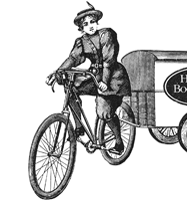
The Philosophy Café at Harvard Book Store
discussion topic:
"Should my nation come first?"
DateMay
16
Wednesday
May 16, 2012 7:30 PM |
LocationUsed Books Department
1256 Massachusetts Ave., Cambridge, MA 02138 |
Tickets
This event is free; no tickets are required.
|
The Philosophy Café at Harvard Book Store is a monthly gathering meant for the informal, relaxed, philosophical discussion of topics of mutual interest to participants. No particular expertise is required to participate, only a desire to explore philosophy and its real-world applications. More information can be found at www.philocafe.org.
The Philosophy Café is held on the third Wednesday of each month, from 7:30-9:30 pm, in the Used Book department on the lower level of Harvard Book Store.
This month:
- We will need to examine what philosophy says about nationalism in general.
- Arguably, the most sophisticated justifications of nationalism can be found in the German Romantic and Idealist traditions: the work of Herder and Fichte come especially to mind. These philosophers argue that self-actualization and freedom must have a social expression and that the relevant social unit can only be one’s nation. We will examine Fichte and Herder’s claims and other arguments for and against this point of view. How does this justification stand up to the cosmopolitan claim that nationalism is inherently parochial and therefore undermines true Human values? What if, as in the American case, the values of the nation are claimed to be universal in nature?
- What defines a “nation” anyway? Communalities of historical and geographical experience, language, culture, and civic affiliation have all been invoked in definitions of nationhood. (During the Republican Primary Race in Puerto Rico, Rick Santorum assured himself defeat in that Primary by saying that, in order to become part of the American Nation, Puerto Ricans needed to learn English.)
- Claims to and attributions of, nationhood are often contested or resisted. (Consider for example the Quebecois, the Protestant minority in Ireland, and Basques in Spain for example.) The Nineteen Century thinker Ernst Renan argued that there was not objective basis for national identity; for Renan, the affirmation of any national identity involves a seemingly arbitrary stressing of some aspects of history and the convenient forgetting of others. National identity seems to be something subjective or constructed. Herder and Fichte might respond; “Of course it’s subjective! What’s wrong with that?” They would argue that subjectivity makes us more than mere objects. Free beings define their own being according to their own subjective desire. National identity, they would say, is an integral part of the self we construct.
Johann Gottlieb Fichte, “14th Address to the German Nation” http://wadsworth.com/history_d/special_features/ilrn_legacy/wawc2c01c/content/wciv2/readings/fichte1.html
Walking from the Harvard Square T station: 2 minutes
As you exit the station, reverse your direction and walk east along Mass. Ave. in front of the Cambridge Savings Bank. Cross Dunster St. and proceed along Mass. Ave for three more blocks. You will pass Au Bon Pain, JP Licks, and the Adidas Store. Harvard Book Store is located at the corner of Mass. Ave. and Plympton St.
(617) 661-1515
info@harvardsquarebookstore.com
Media Inquiries
(617) 661-1424 x1
tmetal@harvardsquarebookstore.com
Fiction Fridays
ALL SUMMER new fiction purchases are 15% OFF on Fridays, both in the store AND online! Use promo code FICTIONFRIDAY at checkout.
Learn More »Shipping & Delivery
Featuring Green Delivery:
books to your doorstep,
same day and with
zero emissions.
Paige M. Gutenborg
Our book-making robot
& your vehicle to millions
of books in minutes.






